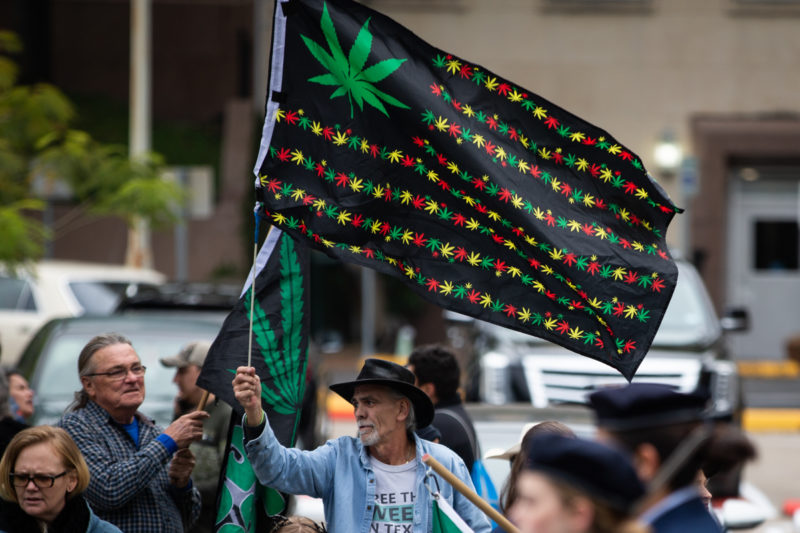Advocates Hopeful for Reform of Marijuana Laws in Texas
By Stephen Cabler
Reporting Texas

Marijuana activists wave flags at the Veterans Day Parade on Sunday, Nov. 11, 2018 on Congress Avenue in Austin. Michael Minasi/Reporting Texas.
During a gubernatorial debate in September, Texas Gov. Greg Abbott shocked some observers when he broke with Republican orthodoxy regarding marijuana legalization. Texans caught with small amounts of marijuana perhaps shouldn’t be sent to jail, Abbott said.
“I would be open to talking to the Legislature about reducing the penalty for possession of 2 ounces or less from the Class B misdemeanor to a Class C misdemeanor,” Abbott said.
Advocates say Abbott’s comments, coupled with changes in the Republican Party platform regarding marijuana and Democratic success in the midterm elections, give them optimism for the possible reform of marijuana laws during the 86th session of Texas Legislature, which opens on Jan. 8.
During the state GOP convention in June, Republicans reversed years of opposition to decriminalizing marijuana.
“The Republican Party of Texas itself has included provisions within their platform that call on not only medical marijuana in Texas but also decriminalization and instituting a civil penalty rather than criminal penalties for low-level marijuana possession,” said Heather Fazio, a coordinator with the Coalition of Texans for Responsible Marijuana Policy.
Fazio said the updated state GOP position regarding marijuana is a reflection of evolving laws around the country.
Texas is one of just 17 states that don’t have a comprehensive medical marijuana law on the books, according to the National Conference of State Legislatures. The state took a small step toward loosening restrictions on marijuana in 2015 with the passage of the Texas Compassionate Use Act. The measure legalized the use of low-THC cannabis oil for Texans who experience epileptic seizures. THC is the psychoactive compound that gives marijuana users a high. Some advocates applauded the law, while others said it was too restrictive.
Fewer than 600 of the estimated 150,000 people eligible for the treatment have signed up to receive low-THC cannabis oil, and only 45 doctors in Texas have signed up to prescribe the oil, according to a report from the San Antonio Express-News.
In an effort to loosen restrictions on medical marijuana in Texas, Sen. José Menéndez, D-San Antonio, filed Senate Bill 90 the Monday after the 2018 midterm elections. The measure would expand access to medical marijuana for Texans with several medical conditions, including cancer, post-traumatic stress disorder, AIDS and Parkinson’s disease.
In a press release Menéndez called the measure “a comprehensive and compassionate medical cannabis bill” that, if passed, would allow “doctors, not politicians” to decide what is best for those Texans suffering from pain, epileptic seizures and a variety of other conditions.
In addition to pushing for more permissive medical marijuana laws, advocates support decriminalizing recreational use of the drug, which potentially could reduce the prison population in the state and save taxpayer money.
In Texas, possession of less than two ounces of marijuana is classified as a class B misdemeanor and can result in up to 180 days in jail and a fine up to $2,000. Possession of two to four ounces is a class A misdemeanor that could lead to up to one year in jail and a fine of up to $4,000
In November, Rep. Joe Moody, D-El Paso, introduced House Bill 63, which would make possession of less than one ounce of marijuana a civil offense, meaning no jail time and criminal conviction.
“Joe Moody’s bill is kind of word for word repeated on the Republican Party platform now,” Hunter White, communications director for Republicans Against Marijuana Prohibition, said. “I think its chances of passing are a lot better than they have been in the past.” The fact that Democrats flipped a dozen Republican seats in the state House is also positive for the prospects of reform of the state’s marijuana laws, White said.
“Unfortunately, it is kind of a truth that the Republican Party has been the largest road block to any of these measures,” White said. “So more House seats flipping to Democrats is positive in a sense because you know nine times out of 10 they are going to support it.”
Another reason Texas may move closer to decriminalizing marijuana, White said, is a shift in public opinion about the drug. Between 2000 and 2018, the number of Americans in favor of legalizing marijuana went from 31 percent to 66 percent, according to Gallup. Seventy-five percent of Democrats and 53 percent of Republicans approve of legalizing marijuana, according to the same poll.
But not all Texans are in favor of legalizing marijuana.
Houston resident Aubree Adams is a member of Mom’s Strong, an anti-marijuana group. Using the drug is like “playing Russian roulette with people’s brains,” Adams said. “Our addiction rate is increasing, our mental illness is increasing and especially our suicide rate is increasing, and I know marijuana is one of the driving factors of that.”
White disagrees with Adams. “Legislators are understanding this issue more than ever,” White said. “Patients and caregivers have more confidence than ever in speaking up and sharing their experience, and I think that sets the stage for meaningful policy change at the Legislature,” White added.